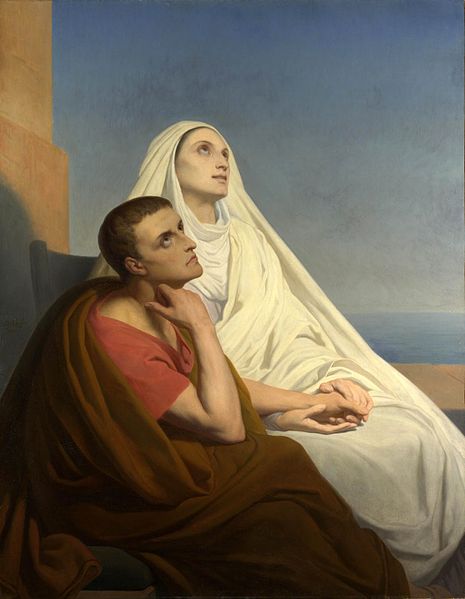
Devoted Wife and Mother, Persistent in Prayer, Model of Patience, Instrument of Conversion
St. Monica
St. Monica is a woman often admired for her patience and perseverance. Though her life presented circumstances which could have easily given way to frustration and resentment, she used her trials to draw nearer to God, resulting not only in her own sanctification, but also in the conversion of those closest to her.
Born in 331 AD in Tagaste, a town in Northern Africa, Monica became well versed in resisting temptation from an early age. As a young girl, she was often asked by her parents to retrieve wine from the cellar and bring it to them. On one such occasion she decided to take a sip of the wine, and she quickly developed a habit. The sips became a bit more generous each time she visited the cellar, and she was convinced no one knew about her routine. Then one day during a quarrel with a servant, Monica was accused of drinking too much, and she realized that her actions had been wrong. She used this as an opportunity to overcome her temptation and promptly stopped drinking wine.
As soon as Monica was of age, her parents married her off to the Roman pagan Patricius who was from her hometown. Not only was Monica forced to endure her husband’s violent temper, but she also lived with her mother-in-law, who was of a similar nature to the irritable Patricius. Though he was annoyed by Monica’s piety and prayer, Patricius respected his wife and was eventually won over to Christianity by her virtuous example. Monica’s marriage was not a happy one, but her life inspired many other wives in her town, and they often sought her advice.
Monica and Patricius had three children who survived infancy – Augustine, Navigius, and Perpetua. While Navigius and Perpetua stayed close to their faith, Augustine became lazy and uncivilized, eventually falling into a life of sin which caused his mother great distress. As a young adult, Augustine subscribed to the Manichean heresy, believing that everything of the flesh is evil. Upon learning of Augustine’s immoral lifestyle, Monica forbade him to return home.
Monica’s disposition toward Augustine changed when she had a vision revealing that her son would eventually return to the faith. She became fiercely committed to prayer and fasting for his conversion, and she stayed close to him despite her disappointment in his lifestyle. She sought the consolation of a local bishop, who assured her that “the child of those tears shall never perish.”
When Augustine was 29 he decided to leave for Rome, and upon learning of his mother’s intention to follow him there, he departed secretly without her knowing. Monica followed him anyway, and when she arrived in Rome, she learned that he had left for Milan. So, Monica went to Milan. It was in Milan that Augustine came under the influence of the bishop, St. Ambrose, who also became Monica’s spiritual director. Augustine experienced his conversion and was baptized by St. Ambrose at Easter in 387, answering the fervent prayers of his mother.
“Nothing in this world now affords me delight. I do not know what there is now left for me to do or why I am still here, all my hopes in this word being now fulfilled.”
After her son’s conversion, Monica began to sense that she was near the end of her life, but she felt that her purpose had been accomplished. “Nothing in this world now affords me delight,” she told her son, “I do not know what there is now left for me to do or why I am still here, all my hopes in this word being now fulfilled.” When asked if she feared dying so far from home, she simply replied, “Nothing is far from God.” Monica passed away in Ostia in 387 AD.
“Nothing is far from God.”
St. Monica is known as the patron of alcoholics, conversion, married women, and mothers. Many also pray for her intercession when in need of patience. She even has a city named for her – Santa Monica, California – particularly because of its “weeping” springs located just outside of town.
Feast Day: August 27

